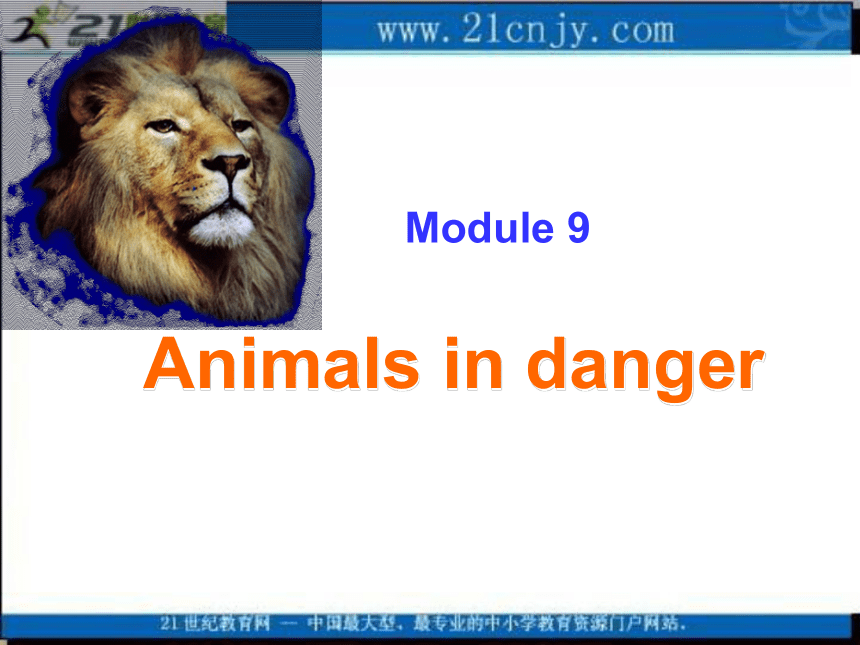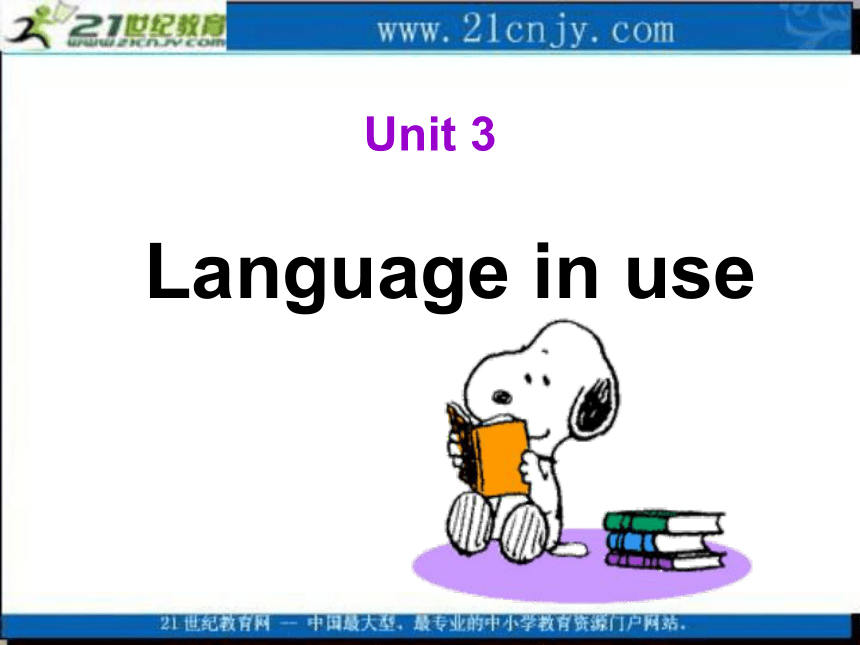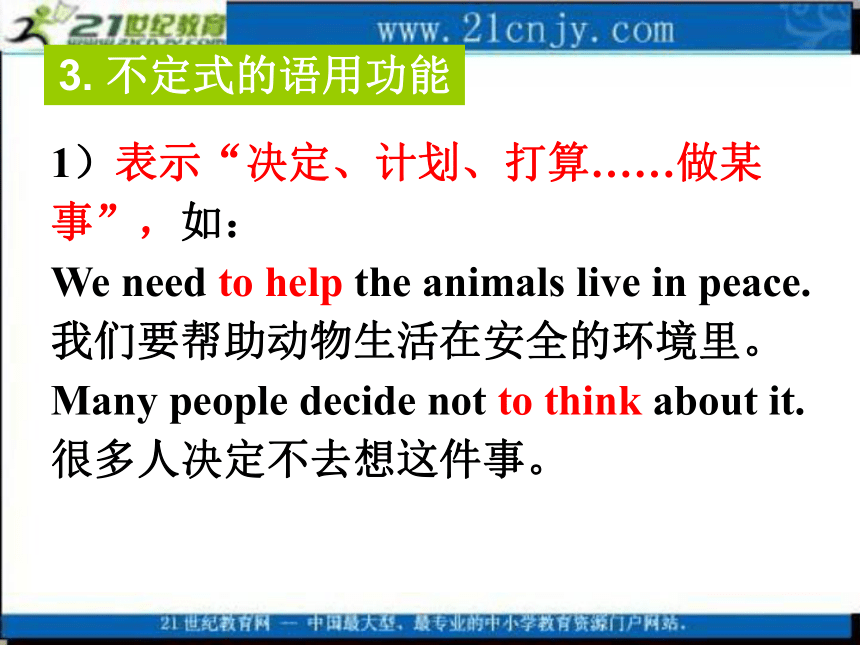八年级上module 9 unit 3 language in use课件
文档属性
| 名称 | 八年级上module 9 unit 3 language in use课件 |

|
|
| 格式 | zip | ||
| 文件大小 | 1.8MB | ||
| 资源类型 | 教案 | ||
| 版本资源 | 外研版 | ||
| 科目 | 英语 | ||
| 更新时间 | 2009-11-01 00:00:00 | ||
图片预览












文档简介
课件36张PPT。Module 9 Animals in dangerUnit 3Language in useGrammar动词不定式当我们要表示“想做某事、需要
做某事或决定做某事”时,就会
出现两个动词连用的情况,这时
应如何表达呢?同学们自然会想到want to do sth.,
need to do sth.和decide to do sth.
等表达方式。主要行为动词后面的动词都采用了
“to+动词原形”的结构,我们把这种
结构称为动词不定式(有时可以不带
to)。动词不定式没有人称和数的变
化,在句子中不能作谓语。下面我们
一起来看一下动词不定式有哪些语法
功能。1. 什么是动词不定式?1. 不定式作主语
不定式作主语时,常用it作形式主语,
而将作主语的不定式放在句子后部。
eg.
It is good to help others.
帮助他人是件好事。
It is exciting to surf the Internet.
上网是件令人兴奋的事。 2. 动词不定式的语法功能:2. 不定式作宾语
学习不定式作宾语时,要注意掌握后接不
定式作宾语的动词。常见动词有: want,
hope, wish, like, begin, try, need, forget,
agree, help 等。
Many people decide not to think about it.
许多人决定不去想这件事。
I want to go to the library.
我想去图书馆。 3. 不定式作定语
不定式修饰名词或代词,起形容词的
作用,在句中作定语,放在被修饰对
象的后面,请看下列句子:
I have a lot of homework to do.
我有很多作业要做。
I’m hungry. Give me something to
eat, please. 我饿了, 请给我点吃的吧。4. 不定式作状语
不定式常常作目的状语、原因状语、结
果状语等。不定式作状语时,要注意不
定式的逻辑主语应与句子的主语保持一
致。
I came to Beijing to see my grandpa.
我来北京看望我爷爷的。
I’m glad to meet you!很高兴见到你!
I’m too tired to walk.
我太累了,走不动了。5. 不定式作补语
不定式可以作补语,如:
She told me to buy a ticket.
她让我去买张票。
6. 不定式作表语
不定式还可以作表语,如:
Our duty today is to clean the floor.
今天我们的任务是打扫地板。3. 不定式的语用功能1)表示“决定、计划、打算……做某
事”,如:
We need to help the animals live in peace.
我们要帮助动物生活在安全的环境里。
Many people decide not to think about it.
很多人决定不去想这件事。这是同学们最熟悉的表达方式,再如:
hope to do sth., plan to do sth.和want to
do sth.。我们会发现,动词后面的不定
式所表示的都是未来发生的事情。如果
表示“决定不做某事,打算不做某事”,
就可以采用decide not to do sth.和plan
not to do sth.结构的句型。
这种放在动词之后的不定式,表示决定
和打算的行为,被称为动词宾语。2)表示对某一行为的描述,如:
It was interesting to learn about the
Wolong Panda Reserve.
了解卧龙大熊猫自然环境保护区的知
识很有趣。
It’s sad to think about all those animals
in danger.
想起那些濒危动物让人很难过。当我们要表示“做某事很重要”等类似概
念时就可以使用包含动词不定式的这个
句型:It is … to do sth. 如:
It is important to build a nature reserve.
建立一个自然保护区十分重要。
It is good to get up early in the morning.
早晨早起有好处。
在这些句子中,it所指的正是不定式所
表达的概念,it为形式主语,不定式为
真正主语。3)表示一个人对某件事的态度,如:
Are you surprised to find out that whales
are in danger?
发现鲸处境很危险你感到震惊吗?
当我们表示类似于“见到您很高兴”之类
的意思时,可以采用sb. be glad to do sth.
的句型。如:
He was happy to see them again.
他为再次见到他们而感到高兴。4)表示某一事或物的某种属性,如:
Their water isn’t good to drink…
他们的水不适宜饮用……
当我们要表达诸如“这个问题很难回
答”、“这些苹果不好吃”之类的意思时,
一般可以采用sth. is +形容词+ to do的结
构。如:
This question is difficult to answer.
这个问题很难回答。5)计划、方案、时间等名词后常用不定式,如:
The government has made a new plan to
help pandas.
政府已经制订了一个保护大熊猫的新计
划。
不定式在句中作名词的定语。6)表示目的,如:
Our government is working hard to save
pandas. 政府正在努力拯救大熊猫。
在英语中如果表示“做某事是为了什么”
时,就可以用动词不定式表示目的,称为
目的状语。不定式可以放在句首,也可以
放在句尾。如:
To catch the early bus he got up at 5
o’clock in the morning.
为了赶上早班车,他早晨5点就起床了。7)表示“可以派某种用场”这类意思,如:
Many animals have no place to live in.
许多动物没有地方生存。
当要表示“可以居住的房间”、“可以食用
的东西”、“可以停车的地方”等类概念
时,就可以用动词不定式,在这种句子
中不定式作名词的定语。如:
There is no place to park cars in this area.
这里没有可以停车的地方。8)表示某事或物怎么样,如:
The difficulty is to stop people killing
them.
最困难的是阻止人们猎杀它们。
Your duty today is to send these letters
out.
你今天的任务就是把这些信都发出去。
本句中不定式置于系动词后面,作表
语,对主语进行补充说明。课堂小测验Individual activity1. Would you please tell me next?
A. how to do B. what to do C. what do I do D. how I should do
2. The girl wasn’t to lift that
bookcase. A. too strong B. enough strong C. strong enough D. so strong 一、单项选择。3. For a time his grandmother found ____
accept his new idea. A. hard B. it hard
C. it hard to D. it is hard to
4. As she has never been there before, I’ll
have someone her the way. A. show B. to show
C. showing D. showed
5. You drive slowly. The roads are wet. A. had rather B. would rather C. had better D. would better 6. Nothing can make the brave soldier ____
his country. A. turn against B. to turn against C. to turn to D. turn to
7. In the old days it was difficult for the
poor a job. A. find B. to find
C. look D. to look for 8. When learning a foreign language, try our
best the spirit of it. A. master B. hold
C. take hold of D. to master
9. It was foolish his car unlocked. A. for him to leave B. of him to leave C. for him leave D. him to leave
10. Remember the newspaper when
you have finished it. A. putting back B. put back C. to put back D. will put back 11. Napoleon spoke so loudly as to ___ in
front of his soldiers. A. hear B. be heard C. listen D. be listened to
12. Television and radio _____ to know what
is going on all over the world. A. made it possible of us B. have made us possible C. have made it possible for us D. have made it be possible for us 13. I have enjoyed my visit here. I’ll be very
sorry . A. for leaving B. to leave C. if leaving D. to have left
14. I don’t see how I could possible manage
____ the work without _____. A. to finish; helping B. to finish;being helped C. finishing;helping D. finishing;being helped 15. We all think it most foolish ____ this
mistake. A. for you making B. of you to make C. you to make D. for you to make
16. Because of air pollution being greatly
reduced, this city is still . A. a good place which to be lived in B. a good place to live C. a good place to live in D. a good place to live for 17. — You were lost on your way to the lake,
weren’t you?
— Yes, we were and had to stop _____
the way. A. asking B. to ask
C. asked D. to be asked
18. She felt it a great shame so severely
in the presence of her boy friend. A. to criticize
B. to have criticized C. to be criticized
D. to have been criticized 19. The advertisements are trying people
to buy things they don’t really need. A. persuade B. persuading C. be persuading D. to persuade
20. If you were much younger, I would
arrange as the general manager,
for all your colleagues speak highly of
your work. A. for you to work B. of you to work C. for you work D. you work 21. On our way back home, we ___ lunch
because we felt hungry. A. stopped to have B. stop to have C. stopped having D. stoped to have
22. I did nothing but ____ my lessons last
Sunday. A. go over B. to go over
C. went over D. go on 23. I’d prefer home rather
than a walk. A. to stay; to take B. stay; to take C. to stay; take D. stay; take
24. He was so foolish his car unlocked. A. to leave B. that leave C. as to leave D. for him to leave 25. Your flat needs . Do you
want me it for you? A. to clean; to do B. cleaning; doing C. cleaning; to do D. to be cleaned; doing
26. What the scientist said greatly encouraged
us the experiment again, but his
secretary’s words discouraged us the
experiment any more. A. to try; to do
B. to try; from doing C. for trying; from doing
D. trying; to do 二、用所给动词的适当形式填空。1. Do you know when ______ (have) a
picnic?
2. She is very busy today. She has a lot
of work _____(do).
3. Our teacher asked us _____(be)
careful when we crossed the road.
4. It’s easy for us _________(answer)
the question.to haveto doto beto answer三、汉译英。1. 我们需要更好的保护它们。
2. 许多动物没地方住。
3. 我们究竟能做什么?
4. 现在有许多濒危动物。We need to protect them better.Many animals have no place to live.What on earth can we do?Now there’re many animals in danger.Thank you!
做某事或决定做某事”时,就会
出现两个动词连用的情况,这时
应如何表达呢?同学们自然会想到want to do sth.,
need to do sth.和decide to do sth.
等表达方式。主要行为动词后面的动词都采用了
“to+动词原形”的结构,我们把这种
结构称为动词不定式(有时可以不带
to)。动词不定式没有人称和数的变
化,在句子中不能作谓语。下面我们
一起来看一下动词不定式有哪些语法
功能。1. 什么是动词不定式?1. 不定式作主语
不定式作主语时,常用it作形式主语,
而将作主语的不定式放在句子后部。
eg.
It is good to help others.
帮助他人是件好事。
It is exciting to surf the Internet.
上网是件令人兴奋的事。 2. 动词不定式的语法功能:2. 不定式作宾语
学习不定式作宾语时,要注意掌握后接不
定式作宾语的动词。常见动词有: want,
hope, wish, like, begin, try, need, forget,
agree, help 等。
Many people decide not to think about it.
许多人决定不去想这件事。
I want to go to the library.
我想去图书馆。 3. 不定式作定语
不定式修饰名词或代词,起形容词的
作用,在句中作定语,放在被修饰对
象的后面,请看下列句子:
I have a lot of homework to do.
我有很多作业要做。
I’m hungry. Give me something to
eat, please. 我饿了, 请给我点吃的吧。4. 不定式作状语
不定式常常作目的状语、原因状语、结
果状语等。不定式作状语时,要注意不
定式的逻辑主语应与句子的主语保持一
致。
I came to Beijing to see my grandpa.
我来北京看望我爷爷的。
I’m glad to meet you!很高兴见到你!
I’m too tired to walk.
我太累了,走不动了。5. 不定式作补语
不定式可以作补语,如:
She told me to buy a ticket.
她让我去买张票。
6. 不定式作表语
不定式还可以作表语,如:
Our duty today is to clean the floor.
今天我们的任务是打扫地板。3. 不定式的语用功能1)表示“决定、计划、打算……做某
事”,如:
We need to help the animals live in peace.
我们要帮助动物生活在安全的环境里。
Many people decide not to think about it.
很多人决定不去想这件事。这是同学们最熟悉的表达方式,再如:
hope to do sth., plan to do sth.和want to
do sth.。我们会发现,动词后面的不定
式所表示的都是未来发生的事情。如果
表示“决定不做某事,打算不做某事”,
就可以采用decide not to do sth.和plan
not to do sth.结构的句型。
这种放在动词之后的不定式,表示决定
和打算的行为,被称为动词宾语。2)表示对某一行为的描述,如:
It was interesting to learn about the
Wolong Panda Reserve.
了解卧龙大熊猫自然环境保护区的知
识很有趣。
It’s sad to think about all those animals
in danger.
想起那些濒危动物让人很难过。当我们要表示“做某事很重要”等类似概
念时就可以使用包含动词不定式的这个
句型:It is … to do sth. 如:
It is important to build a nature reserve.
建立一个自然保护区十分重要。
It is good to get up early in the morning.
早晨早起有好处。
在这些句子中,it所指的正是不定式所
表达的概念,it为形式主语,不定式为
真正主语。3)表示一个人对某件事的态度,如:
Are you surprised to find out that whales
are in danger?
发现鲸处境很危险你感到震惊吗?
当我们表示类似于“见到您很高兴”之类
的意思时,可以采用sb. be glad to do sth.
的句型。如:
He was happy to see them again.
他为再次见到他们而感到高兴。4)表示某一事或物的某种属性,如:
Their water isn’t good to drink…
他们的水不适宜饮用……
当我们要表达诸如“这个问题很难回
答”、“这些苹果不好吃”之类的意思时,
一般可以采用sth. is +形容词+ to do的结
构。如:
This question is difficult to answer.
这个问题很难回答。5)计划、方案、时间等名词后常用不定式,如:
The government has made a new plan to
help pandas.
政府已经制订了一个保护大熊猫的新计
划。
不定式在句中作名词的定语。6)表示目的,如:
Our government is working hard to save
pandas. 政府正在努力拯救大熊猫。
在英语中如果表示“做某事是为了什么”
时,就可以用动词不定式表示目的,称为
目的状语。不定式可以放在句首,也可以
放在句尾。如:
To catch the early bus he got up at 5
o’clock in the morning.
为了赶上早班车,他早晨5点就起床了。7)表示“可以派某种用场”这类意思,如:
Many animals have no place to live in.
许多动物没有地方生存。
当要表示“可以居住的房间”、“可以食用
的东西”、“可以停车的地方”等类概念
时,就可以用动词不定式,在这种句子
中不定式作名词的定语。如:
There is no place to park cars in this area.
这里没有可以停车的地方。8)表示某事或物怎么样,如:
The difficulty is to stop people killing
them.
最困难的是阻止人们猎杀它们。
Your duty today is to send these letters
out.
你今天的任务就是把这些信都发出去。
本句中不定式置于系动词后面,作表
语,对主语进行补充说明。课堂小测验Individual activity1. Would you please tell me next?
A. how to do B. what to do C. what do I do D. how I should do
2. The girl wasn’t to lift that
bookcase. A. too strong B. enough strong C. strong enough D. so strong 一、单项选择。3. For a time his grandmother found ____
accept his new idea. A. hard B. it hard
C. it hard to D. it is hard to
4. As she has never been there before, I’ll
have someone her the way. A. show B. to show
C. showing D. showed
5. You drive slowly. The roads are wet. A. had rather B. would rather C. had better D. would better 6. Nothing can make the brave soldier ____
his country. A. turn against B. to turn against C. to turn to D. turn to
7. In the old days it was difficult for the
poor a job. A. find B. to find
C. look D. to look for 8. When learning a foreign language, try our
best the spirit of it. A. master B. hold
C. take hold of D. to master
9. It was foolish his car unlocked. A. for him to leave B. of him to leave C. for him leave D. him to leave
10. Remember the newspaper when
you have finished it. A. putting back B. put back C. to put back D. will put back 11. Napoleon spoke so loudly as to ___ in
front of his soldiers. A. hear B. be heard C. listen D. be listened to
12. Television and radio _____ to know what
is going on all over the world. A. made it possible of us B. have made us possible C. have made it possible for us D. have made it be possible for us 13. I have enjoyed my visit here. I’ll be very
sorry . A. for leaving B. to leave C. if leaving D. to have left
14. I don’t see how I could possible manage
____ the work without _____. A. to finish; helping B. to finish;being helped C. finishing;helping D. finishing;being helped 15. We all think it most foolish ____ this
mistake. A. for you making B. of you to make C. you to make D. for you to make
16. Because of air pollution being greatly
reduced, this city is still . A. a good place which to be lived in B. a good place to live C. a good place to live in D. a good place to live for 17. — You were lost on your way to the lake,
weren’t you?
— Yes, we were and had to stop _____
the way. A. asking B. to ask
C. asked D. to be asked
18. She felt it a great shame so severely
in the presence of her boy friend. A. to criticize
B. to have criticized C. to be criticized
D. to have been criticized 19. The advertisements are trying people
to buy things they don’t really need. A. persuade B. persuading C. be persuading D. to persuade
20. If you were much younger, I would
arrange as the general manager,
for all your colleagues speak highly of
your work. A. for you to work B. of you to work C. for you work D. you work 21. On our way back home, we ___ lunch
because we felt hungry. A. stopped to have B. stop to have C. stopped having D. stoped to have
22. I did nothing but ____ my lessons last
Sunday. A. go over B. to go over
C. went over D. go on 23. I’d prefer home rather
than a walk. A. to stay; to take B. stay; to take C. to stay; take D. stay; take
24. He was so foolish his car unlocked. A. to leave B. that leave C. as to leave D. for him to leave 25. Your flat needs . Do you
want me it for you? A. to clean; to do B. cleaning; doing C. cleaning; to do D. to be cleaned; doing
26. What the scientist said greatly encouraged
us the experiment again, but his
secretary’s words discouraged us the
experiment any more. A. to try; to do
B. to try; from doing C. for trying; from doing
D. trying; to do 二、用所给动词的适当形式填空。1. Do you know when ______ (have) a
picnic?
2. She is very busy today. She has a lot
of work _____(do).
3. Our teacher asked us _____(be)
careful when we crossed the road.
4. It’s easy for us _________(answer)
the question.to haveto doto beto answer三、汉译英。1. 我们需要更好的保护它们。
2. 许多动物没地方住。
3. 我们究竟能做什么?
4. 现在有许多濒危动物。We need to protect them better.Many animals have no place to live.What on earth can we do?Now there’re many animals in danger.Thank you!
同课章节目录
- Module 1 How to learn English
- Unit 1 Let's try to speak English as much as possi
- Unit 2 You should smile at her.
- Unit 3 Language in use .
- Module 2 My home town and my country
- Unit 1 It's taller than many other buildings.
- Unit 2 Cambridge is a beautiful city in the east o
- Unit 3 Language in use .
- Module 3 Sports.
- Unit 1 Nothing is more exciting than playing tenni
- Unit 2 This year we training more carefully.
- Unit 3 Language in use .
- Module 4 Planes, ships and trains .
- Unit 1 He lives the farthest from school.
- Unit 2 What is the best way to travel.
- Unit 3 Language in use .
- Module 5 Lao She Teahouse.
- Unit 1 I wanted to see the Beijing Opera.
- Unit 2 It descibes the changes in Chinese society.
- Unit 3 Language in use .
- Module 6 Animals in danger.
- Unit 1 It allows people to get closer to them .
- Unit 2 The WWF is working hard to save them all.
- Unit 3 Language in use .
- Revision module A
- Module 7 A famous story
- Unit 1 Alice was sitting with her sister by the ri
- Unit 2 She was thinking about her cat.
- Unit 3 Language in use .
- Module 8 Accidents
- Unit 1 While the car were changing to red, a car s
- Unit 2 I was trying to pick it up when it bite me
- Unit 3 Language in use .
- Module 9 Population
- Unit 1 The population of China is about 1.37 billi
- Unit 2 Arnwick was a city with 200,000 people.
- Unit 3 Language in use .
- Module 10 The weathe
- Unit 1 It might snow.
- Unit 2 The weather is fine all year round.
- Unit 3 Language in use .
- Module 11 Way of life
- Unit 1 In China ,we open a gift later.
- Unit 2 In England, you usually drink tea with milk
- Unit 3 Language in use .
- Module 12 Help
- Unit 1 What should we do before help arrives?
- Unit 2 Stay away from windows and heavy furniture.
- Unit 3 Language in use .
- Revision module B
